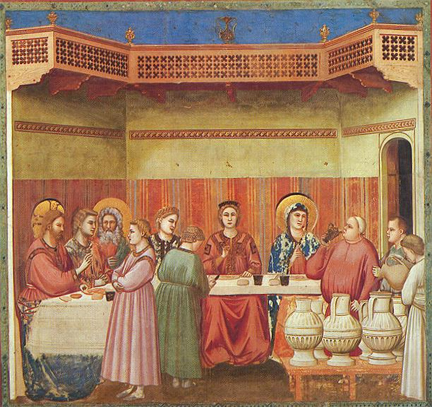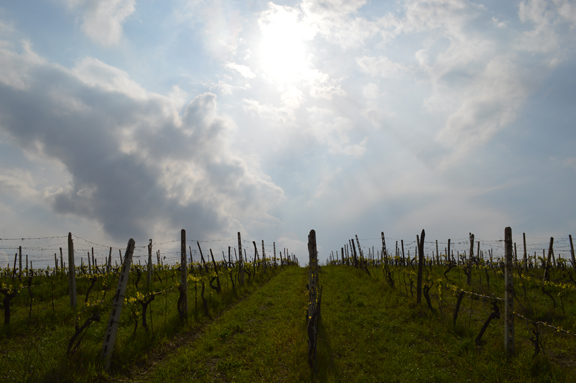
Wine, Easter and the Passover: the miracle of the grape vine
We all know the story of Jesus turning water into wine at Cana, as recounted in the Gospel According to St. John.
The miracle is significant, of course, because "it is the first of the seven miraculous signs by which Jesus's divine status is attested, and around which the gospel is structured" (Wikipedia).
But therein is also another miracle, a human and much more mundane one. According to Jewish tradition, a marriage cannot be performed without a blessing over the wine. Had Jesus not transformed the water into wine, there would have been no marriage that day.
Anyone familiar with Jewish liturgy knows that a blessing over the wine and a sip thereof is a fundamental element of nearly all Jewish ritual. Neither wedding nor circumcision can be performed without wine; the Sabbath cannot be welcomed without wine; a young person cannot become Bat or Bar Mitzvah without wine.

Above: Giotto's "Marriage at Cana," 14th century (image via Wikipedia).
Here's the short version of the blessing "over the wine," the Kiddush or sanctification:
"Blessed are you, Lord, our God, sovereign of the universe, Who creates the fruit of the vine" (click here for the complete Sabbath Kiddush).
Why was wine so important in Jewish liturgy at the time?
It's important to remember that we really didn't understand how wine was made — how grape sugar was transformed into alcohol by yeast — until Pasteur first described fermentation in the mid-eighteenth century. In fact, even today, we still don't understand many elements of vinification.
To the ancients, the grape vine and wine were among G-d's (or the gods') greatest gifts to humankind.
Consider the scarcity of potable water in the Bronze Age. The grape vine, which flourishes even in unfavorable conditions (and in fact, as we know today from fine winemaking, delivers even richer fruit when stressed), provided nourishment and quenched thirst when water was unavailable.
Wine was a beverage that you could store and that you could take on a ship for a long voyage. Just think of the role that wine played in Greek and Roman expansion.
Viticulture and wine production were of utmost importance in the growth of civilization. What was the first that Noah did after the flood? He planted vines and made wine.

Over and over, in Judeo-Christian tradition, wine and the miracle of vinification play a fundamental and even sine qua non role in the human experience.
And with this unique place in human understanding, wine becomes an awesome symbol in our attempts to wrap our minds around divinity.
Transubstantiation, for example, the transformation of wine into the Blood of Christ, as described in the Catholic Church, is one of the greatest and most powerful expressions of the miracle of wine as it is perceived in the Western World.
So whatever wine you pair with your Easter lamb this weekend or whatever wine fills your four cups on the last night of the Passover on Tuesday (the last day of Pesach for Jews living in the diaspora), please remember that wine is so much more than just epicurean delight.
It courses throughout human experience and it remains a miracle — a glimpse of divinity — that we can scarcely understand.
Happy Easter and Hag Sameach to all!
—Jeremy Parzen
follow Jeremy @DoBianchi